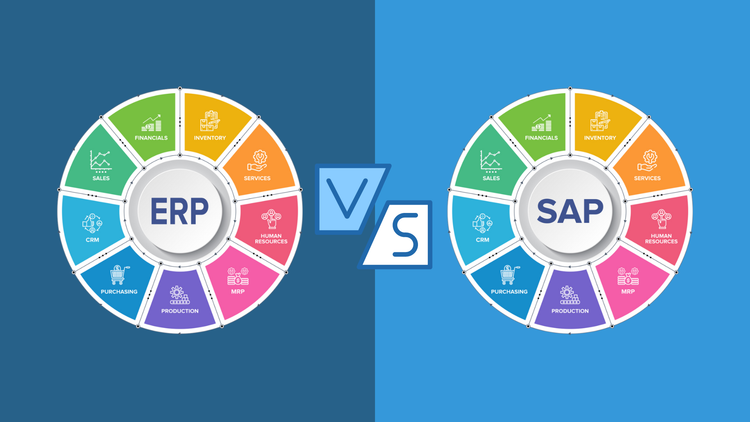The Difference Between ERP and SAP
When researching business software, it’s common to see the terms “ERP” and “SAP” a lot. While they might seem interchangeable, understanding the differences between both are crucial. ERP is a category of business management software, while SAP is a software company that develops and sells various ERP software.
Learn more about the differences of each and why it is important to not confuse the two acronyms when researching software below.

What is ERP?
ERP stands for enterprise resource planning software. ERP is a suite of business tools that usually range from financials to sales and related operations. ERP software was originally developed to automate manufacturing operations; however, it is now an all-in-one software for any type of business. The typical modules included in ERP programs are:
- Accounting
- Budgeting and forecasting
- Customer relationship management
- Human resources
- Inventory and supply chain management
These solutions can either be implemented straight out-of-the-box or undergo customization to include more modules. ERP can also integrate with third-party software to cover even more business functions.
What is SAP?
SAP is one of many ERP software developers on the market. SAP stands for Systems, Applications, and Products in Data Processing. The company, which originated in Germany in the 1970s, has grown to become one of the largest software vendors in the world. Their first software products were related to financial accounting, although even then they were focused on centralizing data storage for easier access and organization. The first product, which resembled an ERP, was R/2, released in 1992.
When people refer to “SAP,” they might be talking about the company or its ERP software products. A few of these include:
Key Differences
| ERP | SAP |
|---|---|
| ERP refers to a wide range of business software designed to optimize back office functions | SAP is a company that develops software, including ERP solutions |
| The ERP initialism stands for “Enterprise Resource Planning” | The SAP initialism stands for “System Analysis Program Development” or “Systemanalyse Programmentwicklung” in the original German |
| The first ERP systems can be traced to the 1960s, although the term wasn’t coined until the 1990s | The SAP company was founded in 1972 by 5 former IBM technology engineers |
| ERP can serve businesses of all sizes across every industry | SAP ERP solutions primarily serve medium to enterprise corporations |
| Some smaller ERPs are less resource-intensive | SAP ERP solutions demand more resources and investment |
Why is SAP Mistaken for ERP?
Because SAP is so well known for creating ERP software, the brand name is sometimes used synonymously with the term. This mostly happens with those who have always used a SAP solution as an ERP, like asking for a Kleenex instead of a tissue. However, for businesses looking to incorporate an ERP into their business process, it’s important to know this distinction to avoid limiting software choices.
In summary, ERP refers to the category of software that integrates various business functions, while SAP is a specific company that provides ERP solutions. Some well-known ERP software providers, aside from SAP, include:
